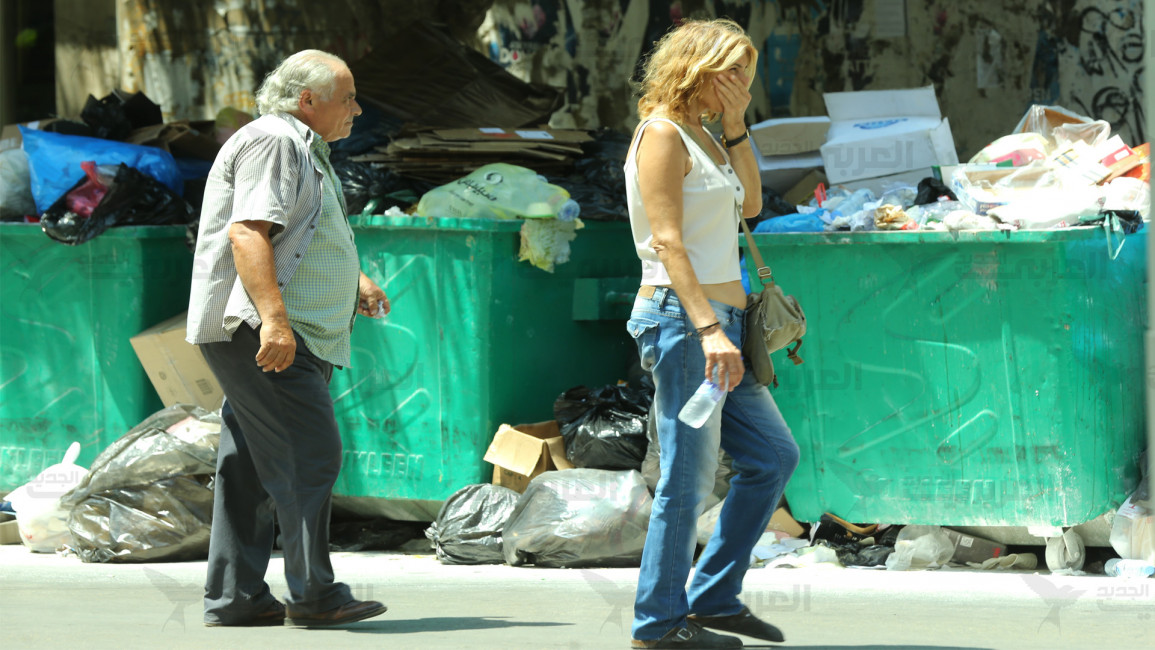Lebanon's rubbish pile needs a political solution
Lebanon's rubbish pile needs a political solution
Waste is piling up on the streets of Beirut, prompting fears that a political stalemate in Lebanon could also lead the country to an environmental crisis.
2 min read
Garbage crisis in Lebanon [Hussein Beidoun]
Rubbish piled up Tuesday on the streets of Beirut amid a growing dispute over tiny Lebanon's largest trash dump, picketed by residents as it should have closed permanently days earlier.
Despite the fact that 50 percent of Lebanon's waste is organic and can be treated, and 39 percent is made up of recyclable plastic, paper, metal, or glass - according to a report by the Council for Development and Reconstruction in Lebanon - most of the rubbish is picked up and thrown in landfills instead of being treated.
The main company in charge of picking up the waste, Sukleen, had its workers sweeping Beirut's streets, though not picking up any of it up. Typically, the refuse would have gone to the Naameh landfill, just south of Beirut, which has been functioning since 1997.
But Naameh was scheduled to close July 17. Since then, residents of Naameh and nearby villages have blocked roads to prevent trucks from reaching it to unload rubbish out of fears it could be reopened.
That's left Beirut's residents dodging the growing piles of litter, now baking in the summer sun.
Sukleen spokeswoman Pascale Nassar said the company kept collecting trash until Sunday night, when their facility in Beirut could not take any more rubbish. Nassar said Sukleen is waiting for authorities to offer them guidance on what to do.
Lebanon's notoriously gridlocked government has yet to take any action on the issue ahead of the next Cabinet meeting on Thursday. Meanwhile, the rubbish pile grows as workers spray them with white powder to knock back the smell and spread of pests.
Environment Minister Mohammad Machnouk said after a meeting of parliament's environment committee that there is no strategic solution for the crisis, though there are 670 dumps around the country that can be used. "Rubbish has to be collected from the streets and this can only happen with everyone's cooperation," Machnouk told the Associated Press news agency.
Despite the fact that 50 percent of Lebanon's waste is organic and can be treated, and 39 percent is made up of recyclable plastic, paper, metal, or glass - according to a report by the Council for Development and Reconstruction in Lebanon - most of the rubbish is picked up and thrown in landfills instead of being treated.
The main company in charge of picking up the waste, Sukleen, had its workers sweeping Beirut's streets, though not picking up any of it up. Typically, the refuse would have gone to the Naameh landfill, just south of Beirut, which has been functioning since 1997.
But Naameh was scheduled to close July 17. Since then, residents of Naameh and nearby villages have blocked roads to prevent trucks from reaching it to unload rubbish out of fears it could be reopened.
That's left Beirut's residents dodging the growing piles of litter, now baking in the summer sun.
Sukleen spokeswoman Pascale Nassar said the company kept collecting trash until Sunday night, when their facility in Beirut could not take any more rubbish. Nassar said Sukleen is waiting for authorities to offer them guidance on what to do.
Lebanon's notoriously gridlocked government has yet to take any action on the issue ahead of the next Cabinet meeting on Thursday. Meanwhile, the rubbish pile grows as workers spray them with white powder to knock back the smell and spread of pests.
Environment Minister Mohammad Machnouk said after a meeting of parliament's environment committee that there is no strategic solution for the crisis, though there are 670 dumps around the country that can be used. "Rubbish has to be collected from the streets and this can only happen with everyone's cooperation," Machnouk told the Associated Press news agency.



